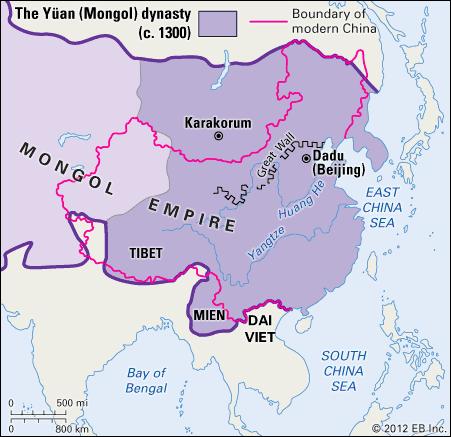
In the eyes of leading artists, the artistic and literary salon of the drama was a piece of virgin soil waiting to be cultivated. This was a period in which, paradoxically, traditional poetry was in decline, after flourishing so brilliantly in the Tang (618-907) and Song (960-1279) dynasties. Regarding the development of the arts, influences in Chinese theater that had been slowly maturing for many years in both its internal structure and external expression suddenly flowered in the Yuan Dynasty.

The prosperity of the Yuan Zajureflected developments in the arts and society as a whole. It quickly flourished, with a number of plays written, and the ranks of performers swelling. After the Southern Song Dynasty (1127-1279) fell to the Yuan Dynasty, the Zajubecame a national drama. At the beginning, the Zaju centered on Dadu (present-day Beijing) and spread widely over northern China. Hence, they are regarded as the most notable achievement of Yuan literature.
YUAN DYNASTY FULL
As a mature, high-class theatrical form, the Yuan Zaju is full of the characteristics of that period, and displays unique artistic creations. Xia, Tingzhi (1990, 1368) Qinglou ji qianzhu (Green Bower Collection), Chinese Theatre Press, Beijing.The dramas of the Yuan Dynasty (1271-1368) are called Yuan Zaju, poetic dramas set to music. An Introduction to Chinese Opera History, Shanghai Wen Yi Publisher, Shanghai. The Secret History of The Mongols & Other Works, House of Stratus, UK. (eds) Chinese Theater: From Its Origins to the Present Day, University Hawaii Press. Hui-ling, Chou: “Striking Their Own Poses: The History of Cross-Dressing on the Chinese Stage” TDR (1988-) Vol. “Some Mysteries and Mootings about the Yuan Variety Play.” Asian Theatre Journal 11, no. Ann Arbor: Center for Chinese Studies The University of Michiganĭolby, William. Chinese Theater in the Days of Kublai Khan. “An Investigation of the Huangmei Opera Film Genre: The Audience’s Perception of Ling Po’s Male Impersonation”. (Hui-ling 1997).ĭespite foreign domination, religious suppression, political oppression and the practice of foot binding, these courageous women prevailed and made great strides towards their personal development and freedom through Chinese Opera. Because of their achievements as male impersonators on stage, these women off stage were able to access literary education which was denied to most women. Ping Yangnu, another famous Yuan actress/male impersonator, “was blind in one eye she tattooed complex patterns on her arms and legs in the style of gangsters in order to vividly portray lulin roles” (Xia 1990:154). For example, “the actress Tian Xixou was an expert in lulin, or valiant brigand roles” (Xia 1990:142). These women portrayed male military figures which demonstrated their mastery of martial arts and acrobatics (Hui-ling 1997). Xia’s accounts of these performers show us that gender as an art form made great strides in the Yuan Dynasty. In 1364 author, Xia Tingzhi, wrote his book Qinglou ji qianzhu (The Green Bower Collection,1990) which included 117 biographies of female actresses of the time. Historical records show that women proliferated in the theatre during the Yuan Dynasty not only for economic means but also to impress and please foreign dignitaries which I presume for their own political power. It wasn’t only scholars who worked to cultivate employ in Chinese Opera but elite women as well. (Dolby, W 1994) And important to note, using colloquial language led to the widespread popularity of Chinese Opera outside of the royal courts so this art form could be enjoyed among all social classes in China. Highlighting his travels in China, Marco Polo, the Italian explorer, wrote that vast entertainment in the capital city of Dadu (now Beijing) was performed for foreigners again reflecting the necessity of local vernacular. Because Khan insisted on colloquial language for entertainment, scholars worked with actors to create plays that were mostly written in local vernacular and which included many songs. In the Yuan Dynasty, Kublai Khan did away with scholars and the elite which gave way to their participation in Chinese Opera. In previous dynasty’s, Chinese scholars wrote in the classical language of China specifically for the royal courts and the elite.

Naturally, this greatly affected all of China, Chinese Opera in particular.

It was Kublai Khan, the grandson of Genghis Khan, who established The Yuan Dynasty (1279–1369 A. Fortunately for us, fourteenth century theatre enthusiast, Xia Tingzhi, wrote a collection of biographies to immortalize these outstanding women.įrom 1205 to 1369, China was ruled by the nomadic Mongols starting with small scale invasions in 1205. D.) was a prolific era for female performers in the Chinese Opera. Lao Sheng (old man), Xiao Sheng (young man), Wu Sheng (warrior)


 0 kommentar(er)
0 kommentar(er)
